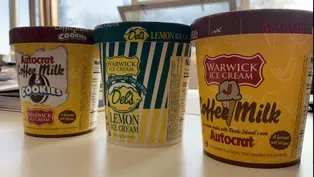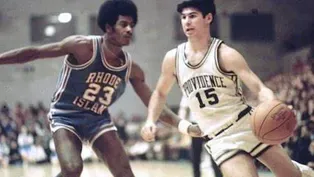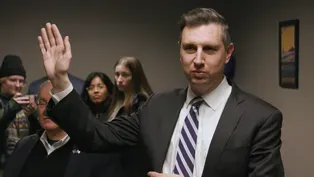
Tale of Two Cities
Clip: Season 6 Episode 14 | 8m 56sVideo has Closed Captions
The Washington Bridge taking an economic toll on one of Rhode Island’s biggest industries
The Washington Bridge debacle is taking its toll on one of Rhode Island’s biggest money-makers: the five-million-dollar hospitality industry. Tourism, restaurants, hotels, casinos, breweries, wineries, and amusements have all experienced a negative economic impact. Find out which community is being hit hardest and which ones have actually seen an uptick in business in our series “Breaking Point."
Problems with Closed Captions? Closed Captioning Feedback
Problems with Closed Captions? Closed Captioning Feedback
Rhode Island PBS Weekly is a local public television program presented by Rhode Island PBS

Tale of Two Cities
Clip: Season 6 Episode 14 | 8m 56sVideo has Closed Captions
The Washington Bridge debacle is taking its toll on one of Rhode Island’s biggest money-makers: the five-million-dollar hospitality industry. Tourism, restaurants, hotels, casinos, breweries, wineries, and amusements have all experienced a negative economic impact. Find out which community is being hit hardest and which ones have actually seen an uptick in business in our series “Breaking Point."
Problems with Closed Captions? Closed Captioning Feedback
How to Watch Rhode Island PBS Weekly
Rhode Island PBS Weekly is available to stream on pbs.org and the free PBS App, available on iPhone, Apple TV, Android TV, Android smartphones, Amazon Fire TV, Amazon Fire Tablet, Roku, Samsung Smart TV, and Vizio.
Providing Support for PBS.org
Learn Moreabout PBS online sponsorship- The first week after that happened, I don't know if you recall, but traffic was absolutely insane.
I was driving into work from Warren, where I live, and I was having to drive all the way around and through Pawtucket to get into the east side of Providence.
I mean, it was just brutal.
- [Pamela] It's been a long haul for Rhode Islanders since December of 2023.
That's when a young engineer saw this, a critical gap in rods under the westbound Washington Bridge.
The state immediately shut it down, leaving not just commuters, but commerce in a sudden jam.
Asher Schofield, who drives from the East Bay to his Hope Street shop in Providence, The Frog and Toad, says the initial ramifications were significant.
- When it first happened that December of 2023, immediately, our business fell off a cliff.
Our business was maybe 50% of what it usually would be, which was very scary, because we're talking about fourth quarter holiday retail, which is, for a small business, like make or break time.
- [Pamela] Schofield says things eventually improved for his two Providence locations.
- Things stabilized, and since then, we haven't seen any drop offs, per se.
- [Pamela] Which wasn't the case for some other businesses in Providence.
Schofield says it seems people are avoiding the drive to or through the capital city.
- We're provincial.
We don't have to go too far and be too inconvenienced.
We live in the smallest state, and it should be easy to get to the store, or the mall, or what have you.
- [Pamela] A recent report illustrates the point.
The comprehensive economic impact study, conducted by Salve Regina University and the Rhode Island Hospitality Association, reveals significant consequences for the industry.
From December, 2023 through the end of last year, Providence County took the worst hit, accounting for more than 56 million of the sector's total revenue loss.
Another casualty, the elimination of almost 700 hospitality related jobs.
Kent, Newport, and Washington counties also experienced economic declines, indicating how widespread the effect of the bridge's closure, and subsequent traffic delays, had on cities and towns depended upon hospitality driven revenue.
The industry includes hotels, restaurants, amusements, and tourism businesses.
The Frog and Toad, for example, sells a myriad of Rhode Island souvenirs.
Schofield believes another fallout from the bridge is psychological.
- I think that culturally, as Rhode Islanders, it's in a way been a fulfillment of our worst impressions of the state that we live in, which is what makes me feel sad.
So it's almost like that bridge that I pass on the daily has become like this totem of a stereotype of all of the negative things that people have to say about the state.
- Complexities from the bridge have not been an entirely negative experience for one part of Rhode Island.
The same study notes a reverse trend.
Bristol County realized a more than 2% gain in hospitality revenue.
That translates to some six and a half million dollars.
Are you surprised by the findings that say that the Bristol County area is actually doing better than it was before the bridge business?
- I was a little surprised.
Not shocked.
- [Pamela] However, Andy Arruda, who is chairman of the East Bay Chamber of Commerce, says the study makes sense because this area is insulated from the bridge.
The chamber represents businesses from Bristol, Warren, and Barrington.
Arruda says they learned from past economic downturns how to pivot during a crisis.
- We just got over the pandemic, and then the bridge closes, and the fear that what are we gonna do without customers from Providence, and Cranston, and north of Providence.
But everybody adapted, and they just, I think they worked harder.
They marketed more.
I just think that people like, it is what it is.
There's nothing we could do about it.
So they dug in, they became a little more creative.
- [Pamela] Arruda cites a strong sense of community in Bristol County, and says the Chamber offers frequent business after hours, and coffee connections.
- Business members go there and they share ideas.
They introduce themselves to everybody.
So you know if there's a plumber there, if there's a financial person, there is a mechanic there.
Everybody is there to not only get business, but also find sources for business.
- [Pamela] Arruda also says a small percentage of business picked up from Portsmouth and Middletown neighbors traveling the Mount Hope Bridge.
The same for Seekonk and Swansea residents.
- I am talking to people all the time in the East Bay.
I heard very few that said, "Yeah, we're still down because of the bridge."
For the most part, it was, "We're holding our own."
That was used a lot.
Overall, I think they're up a little bit.
- What do you attribute that to?
- Boy, a lot of it would be restaurants.
Our restaurants are really strong in the East Bay.
- We actually have rotation this year.
- [Pamela] At the Portside Tavern in Bristol, business is steady, according to owner Richie Corrente.
He says it took a quick dip after the bridge closed, but bounced right back.
- If anything, you know, maybe people didn't want to leave town as much.
Bristol's a really awesome community, and it definitely supports its own.
So I know most locals here would prefer to eat and shop in Bristol when they can.
Everybody's friends, everybody's looking out for each other.
Everybody would prefer to shop locally.
- [Pamela] Corrente says his town also has an atmospheric appeal, sometimes referred to as the Little Newport.
- They're definitely investing in the waterfront.
There's new people coming every day.
You know, we have the best 4th of July party in the country.
It's a good community.
You're on the water, but you're not paying Newport prices.
- [Pamela] In Bristol's downtown, Corrente owns a second restaurant on Hope Street.
Roberto's offers Italian cuisine.
Corrente says he has to travel to Providence for supplies once or twice a week.
- You definitely don't wanna be doing that at 8:30, 9 o'clock in the morning.
And maybe you're less likely to go that route.
You know, maybe on a Friday night, instead of heading to some of the great restaurants down on the hill, you might be more likely to stay in this area.
That's another reason why, you know, you probably see the trajectory going up.
We also had a couple new breweries open up, Vigilant and Pivotal.
Great places, and I'm sure that all counts in the survey.
So there's just more reason to come to Bristol, for eating and drinking.
- [Pamela] Speaking of drinks, people still seek Delekta's on Main Street in Warren, home of Rhode Island's iconic milkshake, the coffee cabinet.
- That's a Rhode Island thing, and that's enduring.
- [Pamela] Also enduring, according to Asher Schofield, the resiliency of Rhode Islanders, no matter what's coming down the road next.
- I always like to think that when you're smaller, you're nimble.
I think typically, we're pretty good, even though we might be grouchy about it, and have plenty of complaints.
I think we're pretty good about weathering the storm, and soldiering on as a citizenry.
- [Pamela] Andy says carrying on business as usual includes some humor to help cope.
- We've prided ourselves in responding to different moments in time with tongue in cheek whimsical designs.
And so right away, we released a couple of bumper stickers, one of which said, "I did not survive the bridge debacle of 2023."
We sold out of that almost immediately.
If you don't laugh, you're gonna cry.
And if we can give one small measure of stress relief for others in our community that are experiencing any difficulty, that's something, I suppose.
Video has Closed Captions
How the Washington Bridge debacle inspired a new ice cream called crumbling bridge. (3m 50s)
Video has Closed Captions
From North Providence hoopster to P-C star to NBA Rookie of the Year. The story of Ernie D. (9m 26s)
Video has Closed Captions
Representative Seth Magaziner will not move to the congressional district he represents. (3m 57s)
Providing Support for PBS.org
Learn Moreabout PBS online sponsorshipSupport for PBS provided by:
Rhode Island PBS Weekly is a local public television program presented by Rhode Island PBS














